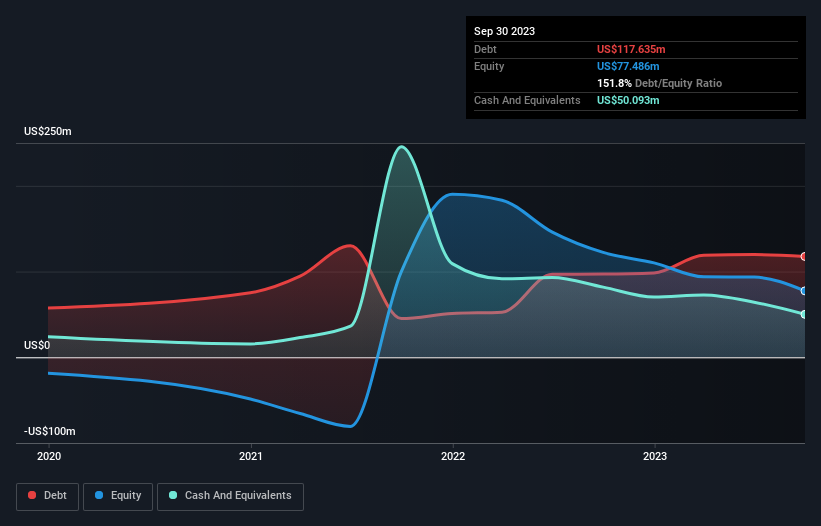
The external fund manager backed by Berkshire Hathaway's Charlie Munger, Li Lu, makes no bones about it when he says 'The biggest investment risk is not the volatility of prices, but whether you will suffer a permanent loss of capital.' When we think about how risky a company is, we always like to look at its use of debt, since debt overload can lead to ruin. We can see that Spire Global, Inc. (NYSE:SPIR) does use debt in its business. But the real question is whether this debt is making the company risky.
When Is Debt A Problem?
Debt assists a business until the business has trouble paying it off, either with new capital or with free cash flow. If things get really bad, the lenders can take control of the business. However, a more common (but still painful) scenario is that it has to raise new equity capital at a low price, thus permanently diluting shareholders. Having said that, the most common situation is where a company manages its debt reasonably well - and to its own advantage. When we examine debt levels, we first consider both cash and debt levels, together.
See our latest analysis for Spire Global
How Much Debt Does Spire Global Carry?
As you can see below, at the end of September 2023, Spire Global had US$117.6m of debt, up from US$97.1m a year ago. Click the image for more detail. However, because it has a cash reserve of US$50.1m, its net debt is less, at about US$67.5m.

How Strong Is Spire Global's Balance Sheet?
We can see from the most recent balance sheet that Spire Global had liabilities of US$42.8m falling due within a year, and liabilities of US$135.8m due beyond that. Offsetting this, it had US$50.1m in cash and US$24.6m in receivables that were due within 12 months. So its liabilities total US$103.9m more than the combination of its cash and short-term receivables.
This deficit is considerable relative to its market capitalization of US$145.3m, so it does suggest shareholders should keep an eye on Spire Global's use of debt. Should its lenders demand that it shore up the balance sheet, shareholders would likely face severe dilution. There's no doubt that we learn most about debt from the balance sheet. But ultimately the future profitability of the business will decide if Spire Global can strengthen its balance sheet over time. So if you want to see what the professionals think, you might find this free report on analyst profit forecasts to be interesting.
In the last year Spire Global wasn't profitable at an EBIT level, but managed to grow its revenue by 38%, to US$100m. With any luck the company will be able to grow its way to profitability.
Caveat Emptor
Even though Spire Global managed to grow its top line quite deftly, the cold hard truth is that it is losing money on the EBIT line. Indeed, it lost a very considerable US$55m at the EBIT level. When we look at that and recall the liabilities on its balance sheet, relative to cash, it seems unwise to us for the company to have any debt. So we think its balance sheet is a little strained, though not beyond repair. Another cause for caution is that is bled US$60m in negative free cash flow over the last twelve months. So suffice it to say we consider the stock very risky. There's no doubt that we learn most about debt from the balance sheet. However, not all investment risk resides within the balance sheet - far from it. Be aware that Spire Global is showing 3 warning signs in our investment analysis , you should know about...
Of course, if you're the type of investor who prefers buying stocks without the burden of debt, then don't hesitate to discover our exclusive list of net cash growth stocks, today.
New: Manage All Your Stock Portfolios in One Place
We've created the ultimate portfolio companion for stock investors, and it's free.
• Connect an unlimited number of Portfolios and see your total in one currency
• Be alerted to new Warning Signs or Risks via email or mobile
• Track the Fair Value of your stocks
Have feedback on this article? Concerned about the content? Get in touch with us directly. Alternatively, email editorial-team (at) simplywallst.com.
This article by Simply Wall St is general in nature. We provide commentary based on historical data and analyst forecasts only using an unbiased methodology and our articles are not intended to be financial advice. It does not constitute a recommendation to buy or sell any stock, and does not take account of your objectives, or your financial situation. We aim to bring you long-term focused analysis driven by fundamental data. Note that our analysis may not factor in the latest price-sensitive company announcements or qualitative material. Simply Wall St has no position in any stocks mentioned.
About NYSE:SPIR
Spire Global
Provides subscription-based data, insights, predictive analytics, and related project-based services worldwide.
Low and overvalued.
Similar Companies
Market Insights
Community Narratives



